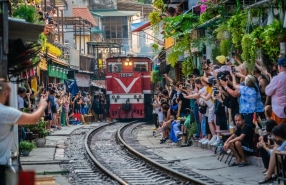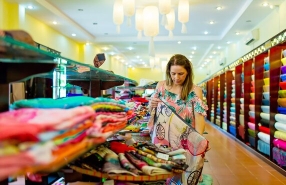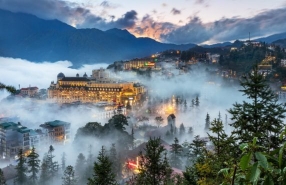Travel To Sapa: Y Ty Saturday Market Full-day Trip With Mr. Ben Toure

Located about 70 km from Sapa, the Y Ty market (Vietnamese name: Y Tý) has long drawn travelers with the warmth and hospitality of its ethnic minorities, combined with the wild, majestic beauty of northern Vietnam’s landscapes. Nestled amid stunning mountain vistas, this vibrant market is a cultural hub where Hmong, Dao, and Ha Nhi people gather to trade goods, showcase traditional crafts and share their heritage. Join us as we delve into the colorful world of the Y Ty ethnic market in Sapa with Mr. Ben Toure, exploring this cultural highlight held every Saturday — a truly unforgettable experience.
Table of Contents
I. Overview of the Y Ty Saturday market in Sapa
- Location: Center of Y Ty commune, Bat Xat district, Lao Cai province, northern Vietnam
- Date: Every Saturday, from 5 a.m. to 9 p.m.
During our trip to northern Vietnam, we stopped in Sapa. It’s truly a beautiful region with postcard-worthy landscapes, and the locals are always warm and welcoming to tourists. In Sapa, there are ethnic markets that only take place on a specific day of the week, where you can meet many ethnic groups from northern Vietnam. Since our market visit in Sapa fell on a Saturday, our guide took us to the Y Ty market, located a few hours from the town center.
Situated in a mountainous area, the Y Ty is a one-day ethnic market, unlike some other markets that only operate in the morning. We decided to visit the Y Ty market so we could take our time exploring. It was also a chance to meet the Hmong, Giay, and Ha Nhi ethnic groups from Sapa Bat Xat.
This market is lively and well-attended. Locals sell and trade their handmade crafts and agricultural products, then gather to enjoy delicious dishes or chat happily together until the afternoon, reuniting after a week apart. If you love discovering culture and purchasing unique local items, the Y Ty Saturday market is a must-see during a trip to Sapa.
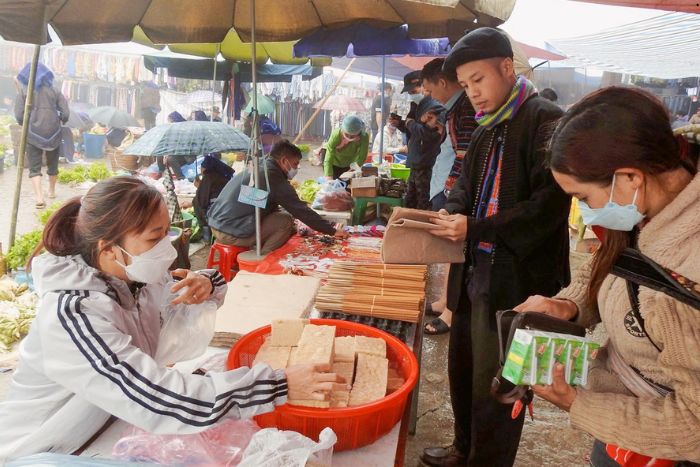
II. How to get to the Y Ty ethnic market in Sapa?
We set off for the Y Ty market in the morning. After visiting several other tourist sites, the Y Ty ethnic market is our last stop of the day, scheduled for the afternoon. We are accompanied by a local guide and driver, both professional and managed by Autour Asia, our Vietnam travel company. We highly recommend our guide, who was enthusiastic and supportive at all times, also sharing fascinating stories about the local people.
One of the unique aspects of the Y Ty market is that it only takes place once a week, creating a highly anticipated event for the locals. Many villagers start their journey as early as 5 a.m., often walking tens of kilometers through mountain trails to attend. For them, the Y Ty Saturday market is more than just a marketplace; it’s a festive gathering, like a holiday, that offers a much-needed break from their daily work routines. Here, they can reconnect with friends who live in other villages, trade goods, share news, and enjoy traditional foods, making it a cherished social experience.
Travel itinerary: Sapa – O Quy Ho Pass – Muong Hum Commune – Den Sang Commune – Y Ty Market.
III. What to visit at Y Ty market in Sapa?
From the moment we arrived at the Y Ty market, we were captivated by the vibrant colors of the traditional clothing worn by the various ethnic groups of the Bat Xat district. The Hmong, Dao, and Ha Nhi people gather here, coming from nearby communes and villages, early in the morning to trade and sell their goods. They often converse in their native languages, and when they don’t share a language, some use gestures to communicate.
Our local guide pointed out the unique features of each ethnic group’s traditional attire. The Ha Nhi people are easily recognized by their dominant blue, black, or indigo clothing, while the Hmong people wear more brightly colored outfits with elaborate accessories. The Dao people, in contrast, dress in red and black with silver necklaces engraved with motifs. Meeting these ethnic groups at the Y Ty ethnic market was a truly memorable experience.
We also visited the traditional clothing stalls, the liveliest area of the Y Ty Saturday market. The garments are entirely handwoven by local artisans. We found beautiful brocade fabrics with ethnic patterns, which we purchased as souvenirs.
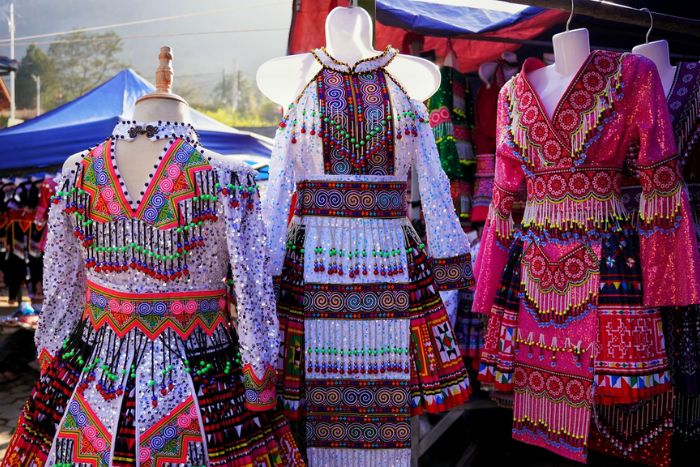
Next, we walked through the agricultural stands, featuring vegetables grown or foraged in the forest by locals. Most of the shoppers were women buying supplies for their families. They carried large woven bamboo baskets on their backs to hold a week’s worth of groceries. Once they finished their shopping, they took a moment to chat with the vendors. Our guide explained that people come to the market not only to trade goods but also to socialize, catch up with friends, and share updates about their lives and work from the past week.
Finally, we stopped at the food area to sample some local specialties. The Y Ty ethnic market offers a variety of local delicacies, such as wild fruits, rice cakes, and grilled meats, creating a lively and smoky atmosphere around the charcoal stoves. I tried a sweet rice cake and other popular snacks here. The cake was sweet and aromatic. Then, I tasted "pho hong", a dish our guide introduced as a regional specialty. Its flavor differed from the pho in Hanoi, richer and even tastier than I had expected.
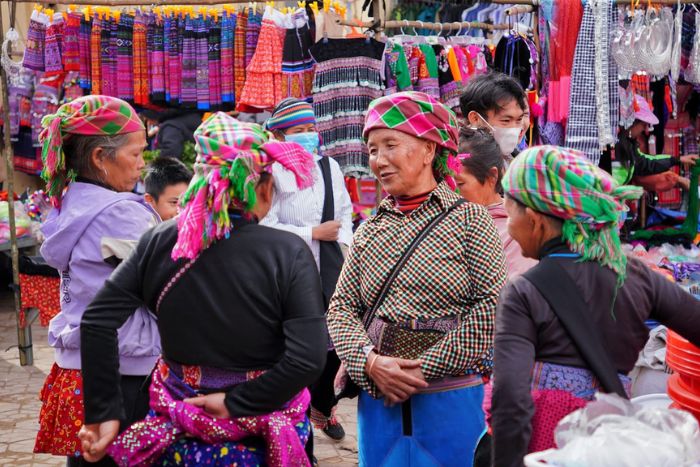
Visiting the Y Ty Saturday market provided us with a unique glimpse into the cultural richness of Sapa’s diverse ethnic groups. The market's lively atmosphere, combined with the colorful attire, traditional crafts, and vibrant exchanges, highlighted the authenticity, simplicity, and warmth of these communities. We left with a profound appreciation for the traditions and people we encountered, and we look forward to exploring even more of these cultural treasures on our next trip to Vietnam.
Yes, the market has a vibrant food section featuring Sapa specialties and traditional dishes of the region. Visitors can savor local delicacies such as freshly made rice cakes, flavorful thang co (made from horse meat), and pho hong. These are beloved regional dishes that highlight the culinary heritage of the Sapa ethnic groups. Additionally, you can sample a variety of wild fruits, which add a refreshing touch to the market experience and showcase the local agriculture.
The Y Ty Saturday market offers a variety of goods, showcasing the rich Sapa culture. You can find locally handmade textiles and traditional clothing that reflect the artistry of the local ethnic groups, ideal for souvenirs. Unique items, such as intricately handwoven brocade fabrics and beautifully crafted jewelry made by ethnic minority artisans, provide an authentic glimpse into the heritage and craftsmanship in northern Vietnam.
Related travel guide
Other similar articles
CUSTOMIZABLE BY LOCAL EXPERTS
Personalized trip at the original price!
REFUND GUARANTEE
We believe in our work and promise to give you money back.
GOOD PRICE / QUALITY
95% satisfied more than expected!
24/7 LOCAL SUPPORT
We are always available online to provide assistance at any time.
Most read articles
Autour Asia is highly recommended on
Embracing the mission of "Satisfied more than expected" and providing authentic experiences, we have received numerous recommendations on reputable travel forums:














